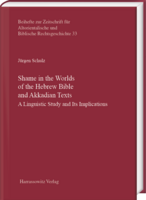|
|
The human notion of ‘shame’ is an anthropological core value. Its significance for cultural-anthropological and sociological studies has long been recognized. The impact of these studies on various academic disciplines, including biblical and Ancient Near Eastern Studies (ANE) is significant. Undoubtedly, the applications of cultural anthropological models have contributed to new insights into the understanding of biblical texts. However, as this study by Jürgen Schulz argues, it is untenable to apply a cultural-anthropological model to ancient texts without first reconstructing the meaning of the ancient lexemes. ANE research still lacks a linguistic investigation of the relevant lexeme bâšu, and the Hebrew lexeme בושׁ also requires a new in-depth analysis. It is the particular research contribution of this work to provide an answer to a question that has often been touched upon but rarely discussed comprehensively: What is the meaning of בושׁ and cognates in the Hebrew Bible and Akkadian texts, and what are the theological and anthropological implications of a cognitive definition?
Shame in the Worlds of the Hebrew Bible and Akkadian Texts is divided into four different parts. Part one provides an overview of the current state of research and introduces the method of frame semantics. Part two focuses on the analysis of the attestations of בושׁ in the Hebrew Bible and an in-depth discussion of selected texts. The same steps are taken in part three with regard to the relevant Akkadian texts. Part four offers a comparative assessment and points out the relevance and adaptability for further research. |






